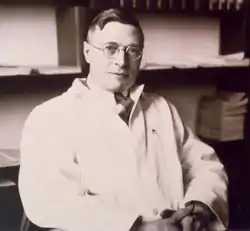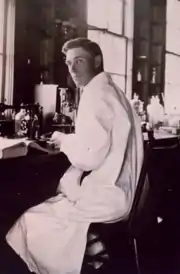James Collip
James Bertram Collip, CBE FRS FRSC FRCP FRCPC (November 20, 1892 – June 19, 1965) was a Canadian biochemist who was part of the Toronto group which isolated insulin. He served as the Chair of the Department of Biochemistry at McGill University from 1928–1941 and Dean of Medicine at the University of Western Ontario from 1947–1961, where he was a charter member of The Kappa Alpha Society.[3]
James Bertram Collip | |
|---|---|
 J.B. Collip in his office at McGill University, ca.1930 | |
| Born | James Bertram Collip November 20, 1892 |
| Died | June 19, 1965 (aged 72) |
| Citizenship | Canadian |
| Alma mater | University of Toronto |
| Known for | Insulin[1] |
| Awards | Flavelle Medal (1936) Cameron Prize for Therapeutics of the University of Edinburgh (1937) Fellow of the Royal Society[2] |
| Scientific career | |
| Fields | Biochemistry |
Education

Born in Belleville, Ontario, he enrolled at Trinity College at the University of Toronto at the age of 15, and studied physiology and biochemistry. He obtained a Ph.D. in Biochemistry from the same university in 1916.
Career
In 1915, at the age of 22, Collip accepted a lecturing position in Edmonton in the Department of Physiology at the University of Alberta Faculty of Medicine, shortly before completing his doctorate. He fulfilled the role for 7 years, eventually rising to the position of Professor and Head of the Department of Biochemistry in 1922. His research at the time was mainly focused on blood chemistry of vertebrates and invertebrates.
He took a sabbatical leave beginning in April 1921, and travelled to Toronto on a Rockefeller Travelling Scholarship for a six-month position with Professor J. J. R. MacLeod of the University of Toronto's Department of Physiology. There his research program (on the effect of pH on the concentration of sugar in the blood) would take him to marine biological stations in Woods Hole, Massachusetts and St. Andrews, New Brunswick before he returned to Toronto late in the year.
MacLeod was overseeing the work of Frederick Banting and Charles Best in their search for a treatment for diabetes which they had begun in May 1921. In December, when Banting and Best were having difficulties in refining the pancreatic extract, MacLeod freed Collip from his other research to enable him to join the research team. Collip's task was to prepare insulin in a more pure, usable form than Banting and Best had been able to achieve to date.
Success of insulin
In January 1922, after 14-year-old Leonard Thompson suffered a severe allergic reaction to an injection of insulin, Collip achieved the goal of preparing a pancreatic extract pure enough for him to recover and to use in clinical trials. Successful trials were soon completed and the future of insulin was assured. Banting, Best and Collip subsequently shared the patent for insulin, which they sold to the University of Toronto for one dollar.
Regrettably, due to disagreements between Banting and MacLeod, there was ill-will generated within the team. The Nobel Prize for Medicine was awarded to Banting and MacLeod in 1923. Feeling that Best had been overlooked in the award, Banting shared his portion with Best. In response, MacLeod shared his portion with Collip. Nonetheless, Collip is often overlooked as a co-discoverer of insulin.
Following this early success, Collip returned to Edmonton to take up a position as Head of the new Department of Biochemistry, and to pursue his own studies on hormone research. In 1928 he was recruited to McGill University in Montreal by his former graduate advisor, Archibald Macallum. Collip served as Chair of McGill's Department of Biochemistry from 1928 to 1941. From 1947-1961, Collip was appointed Dean of Medicine at the University of Western Ontario.[4] He is regarded as a pioneer of endocrine research. He did pioneering work with the hormone Parathyroid hormone (PTH).
He died on June 19, 1965 at the age of 72.
Honours and awards
- Fellow of the Royal Society of Canada, 1925
- Fellow of the Royal Society, 1933[2]
- Honorary Doctorate D.Sc, Harvard University, 1936
- Cameron Prize for Therapeutics of the University of Edinburgh, 1937
- Commander of the Order of the British Empire, 1943
- Honorary Doctorate D.Sc, University of Oxford, 1946
- Medal of Freedom with Silver Palm (US), 1947
- Banting Medal of the American Diabetes Association, 1960
- Honorary Doctorate D.Sc from the University of Western Ontario, 30 May 1964 [5]
References
- Michael Bliss, The Discovery of Insulin, 1982, McLellan & Stewart
- Barr, M. L.; Rossiter, R. J. (1973). "James Bertram Collip 1892-1965". Biographical Memoirs of Fellows of the Royal Society. 19: 234. doi:10.1098/rsbm.1973.0009. PMID 11615724.
- Noble, R. L. (1965). "Memories of James Bertram Collip". Canadian Medical Association Journal. 93 (26): 1356–1364. PMC 1935207. PMID 5321114.
- "James Collip MD PhD | Canadian Medical Hall of Fame". www.cdnmedhall.org.
- http://uwo.ca/univsec/pdf/senate/honorary/honorary_degrees_by_year.pdf
External links
- The Discovery and Early Development of Insulin digital collection, University of Toronto
- Biography of James Bertram Collip
| Professional and academic associations | ||
|---|---|---|
| Preceded by Frederic William Howay |
President of the Royal Society of Canada 1942–1943 |
Succeeded by Olivier Maurault |
